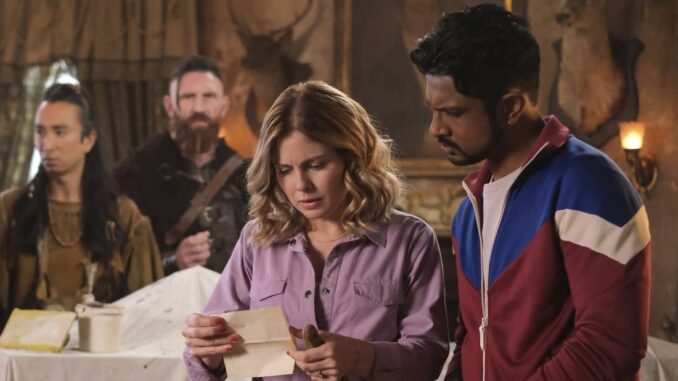
The Ghostly Glitch: How Ghosts Season 5’s “Twist” Highlights a Deeper Problem with the CBS Comedy
CBS’s “Ghosts” has always been a charmingly uneven mix of quirky humor, heartwarming sentimentality, and historical exposition. While the show has cultivated a devoted following with its ensemble of spectral housemates and their living landlords, Season 5’s supposed "twist" – the revelation of [insert specific season 5 twist here, e.g., a new ghost's identity or a pre-existing ghost's hidden past] – ultimately illuminates a more significant problem plaguing the series: a reliance on predictable tropes and a failure to meaningfully deepen the core relationships.
Initially, "Ghosts" thrived on its novelty. The premise of a couple inheriting a haunted estate and subsequently being saddled with its resident spirits offered endless possibilities for comedic clashes and poignant explorations of mortality and legacy. Each ghost, a carefully constructed stereotype from a different historical period, provided a window into a distinct past, allowing the show to deliver bite-sized history lessons alongside its jokes. Hetty, the corseted socialite, Sasappis, the cynical indigenous ancestor, and Pete, the eternally optimistic scout leader, were all initially compelling in their caricatured representations.
However, as the seasons progressed, this initial charm began to wear thin. The characters, while still entertaining, remained largely static. The writers seemed hesitant to truly delve into the ghosts' backstories or explore the lasting impact of their deaths on their personalities. Instead, we were treated to repetitive storylines involving predictable misunderstandings and surface-level explorations of their trauma.
This is where Season 5's "twist" comes in. While intended to add a layer of intrigue and potentially shake up the established dynamic, [explain how the twist feels forced or contrived]. It feels less like a natural progression of the narrative and more like a desperate attempt to inject drama into a show that has become increasingly complacent.
The real problem, however, isn't the twist itself, but what it reveals about the show's overall trajectory. The writers, seemingly afraid to take risks, have opted for easy conflict and predictable resolutions. Instead of truly challenging the characters and forcing them to confront their own flaws and prejudices, they rely on shallow plot devices that ultimately serve to reinforce the status quo.
For example, consider the relationship between [mention two characters and their relationship]. While there have been moments of genuine connection between them, their arc often feels stuck in a loop. The writers introduce a minor conflict, the characters engage in predictable banter, and then the conflict is resolved with a saccharine sentiment that feels unearned. This pattern, repeated across multiple seasons and character pairings, ultimately diminishes the impact of any individual storyline.
Furthermore, the show's reliance on predictable tropes extends to its comedic elements. While the witty one-liners and slapstick humor are initially amusing, they quickly become repetitive. The characters' quirks, once endearing, start to feel stale. The humor often relies on tired jokes about generational differences or stereotypes that, while initially intended to be satirical, can feel insensitive in their execution.
Ultimately, "Ghosts" Season 5's twist serves as a symptom of a larger problem: a lack of ambition and a reliance on formulaic storytelling. The show has the potential to be so much more than a lighthearted sitcom. It has the platform to explore complex themes of identity, trauma, and the enduring impact of history. But instead, it chooses to play it safe, opting for easy laughs and predictable resolutions. Unless the writers are willing to take risks, challenge the characters, and delve deeper into the show's rich potential, "Ghosts" risks becoming a pale imitation of its former self, a ghost of the promising series it once was. It needs to move beyond simply rehashing the familiar and instead embrace the opportunity to truly haunt the hearts and minds of its viewers.